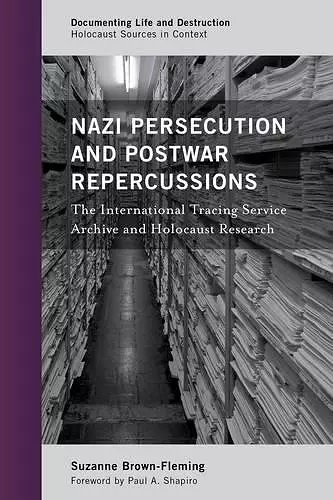Nazi Persecution and Postwar Repercussions
The International Tracing Service Archive and Holocaust Research
Format:Hardback
Publisher:Rowman & Littlefield
Published:3rd Feb '16
Currently unavailable, and unfortunately no date known when it will be back
This hardback is available in another edition too:
- Paperback£25.00(9781538137116)

The International Tracing Service, one of the largest Holocaust-related archival repositories in the world, holds millions of documents that enrich our understanding of the many forms of persecution during the Nazi era and its continued repercussions ever since. Drawing on a selection of recently available documents from the archive, this compelling volume provides new insights into human decision-making in genocidal settings, the factors that drive it, and its far-reaching consequences. The sources that the author has collected and contextualized here reflect the full range of behaviors and roles that victims, their oppressors, beneficiaries, and postwar aid organizations played beginning in 1933, through World War II, the Holocaust, and up to the present.
More than 60 years after the end of World War II, roughly 150 million documents were gradually released to researchers. This evidence cataloged the fates of millions of Jews and other Europeans victimized by Nazi Germany. The International Tracing Service archive yielded concentration camp records, transport and deportation lists, arrest vouchers, prison files, displaced persons and slave-labor documents (implicating scores of corporate, government, and military entities in the use and abuse of forced labor), and a chronicle of inquiries from millions of survivors and extended family members scattered around the world attempting to uncover information about murdered loved ones. More than a half century was required to open the archive; Paul Shapiro, director of the Holocaust Museum's Center for Advanced Holocaust Studies, tells that story in the foreword. Brown-Fleming, senior coordinator of programs at the center, modestly describes this volume as a brief ‘point of entry into a complex collection.’ The resource is utterly invaluable to libraries supporting Holocaust research and any scholar or legal expert aiming to reconstruct at the micro-level the experiences of individuals brutalized by Nazi Germany. Sharing a rich cross section of the archive's vast holdings, the author also explains the manner in which the materials are organized into sub-unitsm. Summing Up: Highly recommended. Upper-level undergraduates through researchers/faculty; professionals/practitioners. * CHOICE *
[T]he ITS will play a key role in combating Holocaust denial in the years ahead. All those familiar with it recognize the power of using this vast quantity of dehumanizing documentation to restore the humanity of the Nazis’ victims. * The Times of Israel *
Brown-Fleming’s meticulous, document-heavy research showcases the ITS’s potential for research. . . . [S]cholars will appreciate the attention to detail. . . . Nazi Persecution and Postwar Repercussions provokes readers to think about how the ITS can and should be utilized. The author reminds her audience that each document represents a bridge to a person, a life, a family, a community, and that it does so in a way that can further Holocaust scholarship and honor the memory of the victims. * Holocaust and Genocide Studies *
A deeply researched, eye-opening, moving, and hugely informative book. The author has done a tremendous service to scholars of the Holocaust, who can utilize the vast ITS collections with greater confidence and efficiency now that they can build on her path-breaking work. -- Dan Stone, Royal Holloway, University of London
The first-ever practical research guide to one of the largest digitized Holocaust-related archives, until recently kept under lock and key. It is well-written and full of engaging biographies that detail the wide range of experiences of victims, perpetrators, and the many bystanders. This remarkable book convincingly charts new paths for learning about the Holocaust. -- Gerald Steinacher, University of Nebraska–Lincoln
A critical addition to any library due to its detailed analysis of one of the major Holocaust document archives in the world—only recently opened to the public. The author has made a superb selection of key documents that represent the remarkable diversity of information available in the ITS holdings. This well-crafted volume will provide both students and scholars a window into a seminal collection that could be daunting without this clear and concise guide. -- Johannes-Dieter Steinert, University of Wolverhampton
- Winner of Choice Outstanding Academic Title 2016
ISBN: 9781442251731
Dimensions: 238mm x 162mm x 25mm
Weight: 612g
306 pages